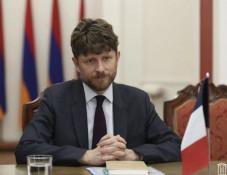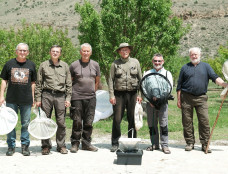
Iranian agency: Wahhabists’ number in Azerbaijan reaches dangerous level
During the independence period, the number and influence of Wahhabis, which also call themselves Salafists, has grown up in Azerbaijan, Iranian news agency AhlulBayt reports.
The agency informs that about 98 percent of Azerbaijan population are Muslims. Shiite Muslims account for at least 85 percent of the total Muslim population of the country. However, at the same time, the Wahhabi movements’ influence grows in the country by funding of Saudi Arabia, Kuwait, the UAE, Egypt and some other Arab countries.
It is noted that Saudi Arabia particularly has managed to give its support of the Wahhabis a legal guise after it signed a religious cooperation agreement with Azerbaijan’s government as well as the Caucasian Muslim Board. Besides, many young people are educated by the Medina International Islamic University, the major center for education of Wahhabi clerics and missionaries. It is emphasized that most of them now are active in the promotion of Wahhabism in Azerbaijan.
“Some of the key figures of Azerbaijani Wahhabi figures are Qamat Suleymanov, Alikhan Mosaov, Vissel Uroojov, Sohrab Sheikhaliov, Samen Mohammadov, who are active on the web and the social networks to promote Wahhabi teachings under the title of Salafism,” AhluBayt reports.
It is highlighted that there are no accurate figures determining the exact number of the population of Wahhabists and Salafists of Azerbaijan. The Azerbaijani media since past few years have talked about existence of 15,000 to 65,000 Wahhabists across the country.
“It could be said that tens of thousands of Wahhabists exist in Azerbaijan, and have reached a dangerous level,” the agency notes.
According to AhluBayt, the Wahhabists are getting further financial sources due to Saudi Arabian funding as well as Azerbaijani government’s ease on licensing them to do business in the country. “However, the field observations of thickly-bearded shopkeepers with short cloths in major Azeri shopping centers show that the Wahhabi class of population formed by Saudi Arabia in Azerbaijan is of considerable financial potentials in the country,” AhluBayt emphasizes.
The Iranian agency suggests that Wahhabists in Azerbaijan are doing business in a network form. Any Wahhabist who receives funding from the Arab sheikhs should be committed to job creation also for his relatives. While most of Azerbaijani population is suffering from unemployment, Wahhabists are the only social class in the country who has no employment problems. Due to financial facilities of Wahhabists, they are influencing fast the different parts of Azerbaijani society.
There are reports that the Wahhabists have managed to make their way among the Azerbaijani state officials, members of the parliament and specifically the media activists. Despite the fact that the affected people have no Wahhabi looks, they guard and accomplish the interests and demands of Wahhabi centers, especially Saudi Arabia, in Azerbaijan. It is specifically highlighted that among the state officials, the Azerbaijani Minister of Emergency Situations Kamaladdin Heydarov holds open and special relations with Emirati sheikhs, and though they could not be seen as Wahhabists, they move in line with “Wahhabist Saudi regime and leave considerable impacts on Azerbaijan.”
It is noted that Baku and Sumgait are particularly under Wahhabists’ focus. Besides, up to 1000 Wahhabi militants went to fight in Syria. Due to their large number in Syria they founded the Society of Wahhabi Azeris in that country.
In addition, according to the news agency, there is a concern that a larger number of Azerbaijani fighters could return from Syrian battlefields to Azerbaijan and pose large-scale threats to the country. However, it is emphasized that the Azerbaijani government does not have enough intelligence and cannot arrest them.
Meanwhile, according to Sputnik Azerbaijan, the country’s law enforcement agencies have finally started the search of two Azerbaijani girls, who left for Syria with their mother in order to join the Islamic State (IS). The exhausted father of the 11-year-old Nazrin and the 56-year-old Lala, Ilgar Yusifzade, after two years, could achieve that his daughters be included in the list of wanted.
It is reminded that Yusifzade’s ex-wife – Parvana – took the girls and stopped calling him. As a result, Yusifzade did not have any information about his daughters and ex-wife for some time. In May 2015, his daughter Nazrin called him and said that they were already in Rakka, Syria. The girl started to beg her father to come and join them, otherwise, according to the girl, her mother would be given into marriage with another man.
Nazrin started to frequently write to her father, send him photos with assault rifle and suicide bomber’s belt. She also took photos of her younger sister with bandages with the IS symbolism on her head. She told her father that they were locked up and that she had learnt to use assault rifle.
“However, Yusifzade refuses to believe his eyes. He is sure that the girl is specially taught what and how to say. Sometimes strangers' voices -- dictating what and how to say -- are heard on audio recordings the girl sent to her father. At the same time, he often notices discrepancies with his daughter’s descriptions on the photos,” the agency informs.
Therefore, the doubts made Yusifzade find a hacker who could help him. The latter determined that in reality, Yusifzade’s daughters are in Azerbaijan. The hacker found the addresses of the apartments, from where the calls had been made. All points of stay of the mother and her daughters were in Baku outskirts. However, going to those apartments, Yusifzade could not find his children.
The desperate father assures that looking for his daughters since 2014, he has managed to collect enough compromising evidence against the law enforcement officials. In case they fail to bring the girls back, Yusifzade threatens to declassify the data about those who have fought in Syria in IS and now are back to their peaceful life in Azerbaijan. “I am afraid that the members of my family can become victims of traffickers. People, who make a living by trading human organs and keeping women in captivity for sexual exploitation, are involved in this case,” Yusifzade stated.
Meanwhile, Forum 18, the website of a Norwegian human rights organization that promotes religious freedom, writes that the deputy chairman of the Muslim Unity Movement party of Azerbaijan, Inqilab Ehadli, who is imprisoned in remand for “espionage,” is believed to be close to death. Lawyer Elshan Hasanov told Forum 18 News Service that the 58-year-old Inqilab had already had a poor health condition at the time of his arrest, in January of the current year.
“But in his home town of Salyan he had authority. Young people came to him with questions about their faith and Islamic law, even members of the clergy,” Hasanov noted.
It is also reminded that at least 68 Muslim Unity supporters, including the movement leader Taleh Bagirzade, as well as Hussainia mosque prayer leader Nuhbala Rahimov, who were arrested during armed assault by security forces on the village of Nardaran in November 2015, are still imprisoned.
Related news
Newsfeed
Videos






























